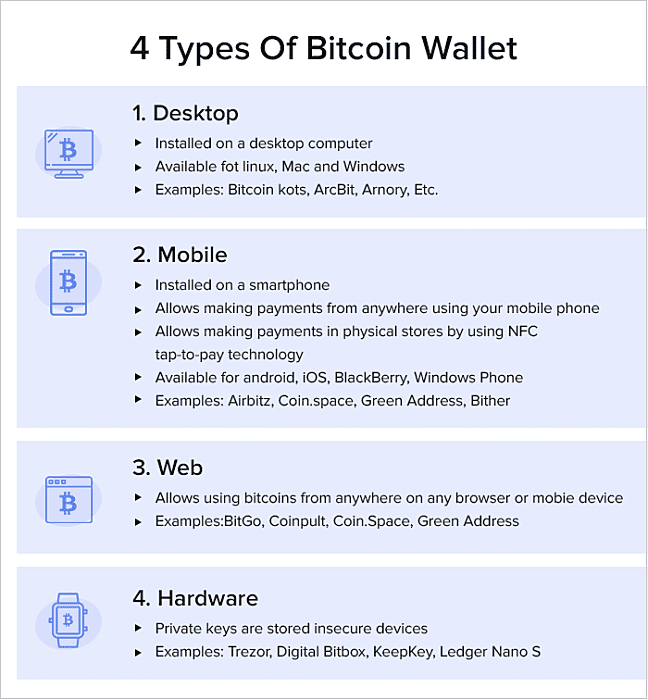
Bitcoin, the most popular cryptocurrency, has found significant usage in the online world over the last decade. Many industries have already embraced it as a means of payment. Currently, more than 120 stores worldwide already accept the digital currency Bitcoin and a lot of others are expected to follow suit in the coming years.
Despite the growing popularity among businesses, individuals still struggle to understand how Bitcoin works. One such challenge that users frequently encounter is the selection of the best Bitcoin wallet app, especially when there are different types of crypto wallets already making rounds in the market. Selecting the proper one is of the utmost importance as it would make your transactions easier.
But why do many users struggle to select a proper Bitcoin wallet app? Read on to find out everything you need to know about wallets and how to select the one that suits your needs.
What Is a Bitcoin Wallet?
A Bitcoin wallet is any software that can securely store bitcoins. They interact with the Bitcoin network and allow users to send or receive Bitcoin. Needless to say, you cannot carry out a Bitcoin transaction without a Bitcoin wallet.
Essentially, it consists of private and public keys.
What Are Private Keys?
Private keys are secret codes that confirm your ownership of a wallet address and the total amount of bitcoins stored in it. It serves as a prerequisite to the generation of your public key.
What Are Public Keys?
Public keys are derivatives of private keys, and they enable users to receive bitcoins to any wallet address attached to them. In short, it is the code you send anytime you wish to receive bitcoins from other users.
For security reasons, public keys are designed to change for each Bitcoin transaction you wish to carry out. That means the wallet address used for one transaction should differ from those used for subsequent transactions. However, they should all reflect in the same wallet address.
What Are Backup Keys?
Just as the name implies, backup keys are a series of 12–24 words that you are given at the point of registration of your wallet. They originate from your private keys and can be used to gain access to your wallet in case you install it on another device, for example.

A compromise or loss of your private key means you have lost ownership of whatever amount of bitcoins that is attached to that wallet address.
Types of Bitcoin Wallets
If you wish to trade or convert Bitcoin to fiat currencies, you will have to register for an online crypto exchange. Once you open an account with the exchange, it will assign you a wallet address automatically.
However, for safety reasons, such types of crypto wallets are not a safe place to store your bitcoins because the exchange has access to your private keys, and there are no provisions for backup keys.
Furthermore, in the wake of any successful hack, thieves can easily gain access to your account and steal your funds forever. That said, keeping your bitcoins at any exchange is not a safe option, which is why you need to resort to other forms of Bitcoin wallets that we discuss below.
1. Desktop Wallet
As the name suggests, desktop wallets are downloaded and installed on PCs and laptops, with your private keys stored on your hard drive.
Although they provide better security than exchange wallets because no third party has access to your private keys, they are still prone to attacks through malware and trojans when you connect to the internet.
2. Online Wallets
There are different types of crypto wallets that run on cloud technology and are controlled by a third party. However, they can be super convenient, given the fact that you can have access to them from any browser device connected to the internet.
Still, a small glitch such as an attack on your cloud provider can easily lead to the loss of your bitcoins.
3. Mobile Wallets
A mobile wallet allows you to run your Bitcoin wallet as an app on your smartphone. As such, all your details and private keys are stored on the hard drive of your phone.
This form of Bitcoin wallet is ideal for users who leverage Bitcoin for everyday transactions such as paying for goods and services. However, mobile wallets are also prone to hacks and theft because they also depend on the internet, just like desktop and online wallets.
4. Hardware Wallets
Hardware wallets are the most secure types of wallets. They allow users to store their private keys offline, using devices like USB. Hardware wallets involve a simple plug and send process when trying to transfer bitcoins.

What to Consider When Selecting a Bitcoin Wallet?
It’s crucial that we know the difference between desktop and mobile crypto wallets because then only we can make the right decision. Below are some of the factors you need to put into consideration while choosing a Bitcoin wallet:
1. Company Reputation
Company reputation is a crucial point for you to consider when selecting your Bitcoin wallet like the Blockchain Wallet app. So many companies offering Bitcoin wallet services have folded up and left with the user's money, never to be heard from again. Hence, it’s important you ensure the company providing you with a Bitcoin wallet is one that is trusted and well established.
2. Security Features
Security concerns are one of the primary reasons why several types of wallets were developed in the first place. You should check with your wallet provider to see if the necessary security features such as two-factor authentication and biometric authentication are in place to help keep your wallet secured.
3. Backup Features
There should be proper mechanisms put in place to protect or rescue digital assets in case of damage.
4. Support Storage of Multiple Cryptocurrencies
Currently, there are over 2,000 cryptocurrencies in the market. Traders are constantly exchanging Bitcoin and other cryptos amongst themselves. Your wallet should be able to accommodate the storage of multiple cryptocurrencies if you also plan to become a full-time trader.
5. Platform Compatibility
Your wallet should also be easily compatible with various software. This is beneficial in cases where you switch between operating systems - for example, when you decide to start using iOS instead of Windows. You should select a Bitcoin wallet app that can function on all devices. This will enable the smooth operation of your wallet across multiple platforms.
Some other factors to consider include:
- Ability to operate multiple Bitcoin addresses within the same wallet
- QR code scanning feature
- Customer service, in case something goes wrong.
Conclusion
Due to the ever-growing advantages of the mobile-based Bitcoin Wallet apps, the adoption of Bitcoin as a payment system is on the rise. But there are still many challenges that regular users face every day.
Most people tend to place their trust in the wallets provided by their online exchanges. Over time, this has proved not to be a clever move, given that exchanges are always prone to attack, which may likely lead to loss of private keys.
Other wallet formats such as desktop, mobile, and hardware have proved to be a more secure and convenient means of storing bitcoins. However, selecting a proper Bitcoin wallet requires research and a good understanding of what to look out for. Over time, factors like security, integrated features, and company reputation have played a huge role in how users select their Bitcoin wallets.
Frequently Asked Questions
-
What Bitcoin wallet should I use?
Here are some Bitcoin wallets that you can use:
- Coinbase
- Trezor
- Electrum
















